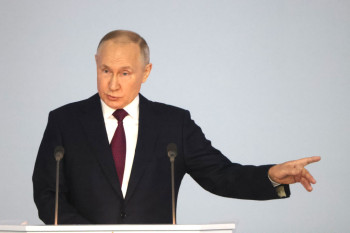The U.K. Minister of State for Defense Annabel Goldie said on March 20 that some of the ammunition her country would deliver to Ukraine alongside Challenger 2 tanks contains depleted uranium.
“Such rounds are highly effective in defeating modern tanks and armored vehicles,” Goldie added.
The U.K. pledged to supply Ukraine with 28 Challenger 2 main battle tanks as part of the Western allies’ assistance package. Multiple countries promised to send dozens of German-made Leopard 2 tanks, and the U.S. promised to send 31 Abrams tanks later this year.
U.K. Defense Secretary Ben Wallace said in an interview with Reuters on Feb. 22 that Challenger tanks could start to arrive in Ukraine in the spring.
Depleted uranium is a dense metal formed as a byproduct of enriching natural uranium for nuclear fuel. Being still radioactive but at a much lower level than the original material, depleted uranium is used in armor-piercing projectiles and bombs for greater penetration power.
According to the U.S. Environmental Protection Agency, depleted uranium can seriously threaten human health if its particles are ingested or inhaled. Munitions containing depleted uranium were used in both Gulf Wars, Serbia, and Kosovo.
Many studies on depleted uranium report no evidence of danger, but their results remain controversial, the Scientific Committee on Health and Environmental Risks of the European Commission wrote.
On March 21, Russian dictator Vladimir Putin condemned the U.K.’s plans to send ammunition containing depleted uranium to Ukraine, saying Moscow “would have to respond accordingly,” as quoted by Reuters.
“I would like to note that if all this happens, Russia will have to react accordingly," Putin said during a news conference Tuesday alongside his Chinese counterpart. "I mean that the collective West is already starting to use weapons with a nuclear component,” referencing that the shells have depleted uranium.
The U.K. Ministry of Defense said Russia is “deliberately trying to disinform” after Putin warned the country against providing Ukraine with ammunition that contains depleted uranium, according to CNN. The ministry later elaborated that “the British Army has used depleted uranium in its armour-piercing shells for decades. It is a standard component and has nothing to do with nuclear weapons or capabilities. Russia knows this, but is deliberately trying to disinform.”
Russia has made a series of nuclear threats since the beginning of its full-scale invasion of Ukraine.
The Kremlin's continuous messaging of low-credibility threats of nuclear escalation aims to "intimidate the West and appeal to its (Kremlin's) ultranationalist base," the Institute for the Study of War wrote on March 2.










